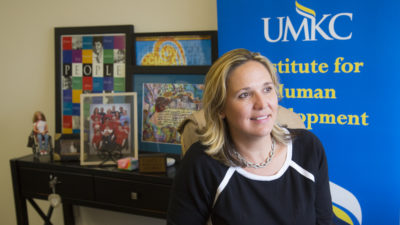Photo credit: Janet Rogers, Division of Strategic Marketing and Communications
Families Have Michelle Reynolds in Their Corner
This August, President Obama will gather his new appointees for the President’s Committee for People with Intellectual Disabilities (PCPID) in Washington, DC. Among them will be Michelle C. (Sheli) Reynolds, Ph.D., an 18-year University of Missouri-Kansas City Institute for Human Development program director.
Reynolds works as a research associate and Director of Individual Advocacy and Family Support at the UMKC Institute for Human Development (IHD), home to one of 67 University Centers for Excellence in Developmental Disabilities. Her role includes leading the Missouri Family to Family Resource and Health Information Center (MO F2F) team, which helps fulfill IHD’s mission to create partnerships for effective social change.
The MOF2F team provides individualized assistance to people with disabilities and their families, as well as support for professionals who meet their needs. MOF2F also links families to each other through a peer-to-peer mentorship program, and works to strengthen the existing disability service system network by providing quarterly forums for discussion and collaboration.
During her time at IHD, Reynolds earned an Interdisciplinary Ph.D. in Public Administration and Sociology at UMKC. Her focus was family support research and policy for families of individuals with disabilities.
IHD Director Carl Calkins is pleased with the recognition Reynolds is receiving for her dedication to families and people with disabilities.
“Sheli’s work has gained statewide and national reputation, as is evidenced by this honor,” Calkins said. “We are very proud of her accomplishment.”
Her work at IHD is taking her to the national stage. As a leader in the federally funded National Community of Practice for Supporting Families of Individuals with Intellectual and Developmental Disabilities, Reynolds is making major contributions to the disability field. Reynolds’ success on this and other projects has led to growing recognition of her efforts by the Commissioner of the Administration on Intellectual and Developmental Disabilities (AIDD) and others.
A frequent presenter at professional conferences, Reynolds focuses on helping society see beyond the disability and focus on the person. Through presentations at national conferences like “Supporting Real Lives, for Real People” and “Charting a New Life Course,” Reynolds urges action that will promote full inclusion.
Reynolds has two goals for her time on the President’s Committee: upholding the rights of all people, including those with disabilities, to have a vision, hope and natural expectation for a full life; and strengthening the role and voice of siblings.
“I am the sibling of a younger brother with developmental disabilities,” Reynolds said. “I’m not just sympathetic with families’ experiences. I’ve lived them. And although my family does its best, things still fall out of the sky; then my family and I have to figure out how to deal with it. Just imagine what it’s like for families who don’t have the knowledge base I have, and don’t even know where to begin.”
Reynolds intends to work for policy changes that enable siblings to make managed care decisions for a brother or sister with intellectual disabilities when necessary, a responsibility she can foresee in her future.
The President’s Committee is aligned with Reynolds’ priorities. Established in 1966 (formerly named the President’s Committee on Mental Retardation), its goal is to improve the quality of life experienced by people with intellectual disabilities by upholding their full citizenship rights, independence, self-determination and lifelong participation in their communities. The committee provides advice and assistance to the President of the United States and the Secretary of Health and Human Services on a broad range of topics pertaining to intellectual disabilities.
Reynolds asserts that those with cognitive disabilities are often denied their civil rights. She promotes the ideal that all citizens have the right to live, love, work and play in their communities.
“For so long,” Reynolds said, “the disability field held a narrow view of people with developmental disabilities. It focused on health and safety, instead of quality of life. Historically, families were told the best thing for their child would be institutionalization. Now, the focus is on individuals’ rights as citizens of the United States.”
“It wasn’t until 1986 that Medicaid was modified to provide services in the community for people with developmental disabilities. Even now, only 25 percent of the nearly five million people with these disabilities have access to state services. Everything else falls on the families to provide, which is why supporting them is so important.” Reynolds knows that these are real people, just like her family, struggling to have as normal and happy life as possible. She knows, too, that her brother will always be a big part of their family.
Now her passion and tireless work on behalf of families and individuals with disabilities is bearing even more fruit, this time in in Washington, D.C.
President Obama described Reynolds and the others as extraordinarily dedicated, saying, “I am grateful they have agreed to serve this Administration… and greatly serve the American people.”
| Sandra Beaty, Division of Strategic Marketing and Communications

